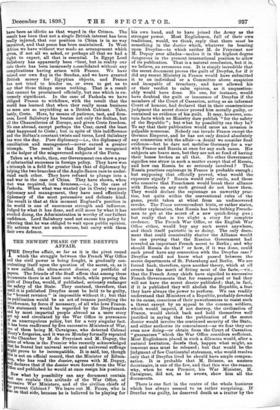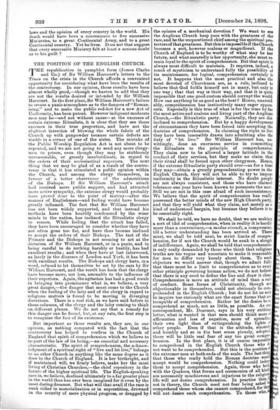THE NEWEST PHASE OF THE DREYFl7S AFFAIR THE Dreyfus affair,
so far as it is the pivot round which the struggle between the French War Office and the civil power is being fought, is gradually con- centrating itself upon the question of the secret, or. as it a now called, the ultra-secret dossier, or portfolio of papers. The friends of the Staff affirm that among these documents there is at least one which, while proving the guilt of Dreyfus, would, if published, seriously endanger the safety of the State. They contend, therefore, that until it is published Dreyfus must be held to be guilty, for "honest revision" is impossible without it ; but that as publication would be an act of treason justifying the interference, by force if necessary, of all who love France. This statement would be regarded by the Dreyfusards and by most impartial people abroad as a mere story got up and circulated by the War Office in pursuance of an unscrupulous policy, but for a very singular fact. It has been reaffirmed by five successive Ministers of War, one of them being M. Cavaignac, who detected Colonel yenry's forgeries, and it was on Monday formally repeated In the Chamber by M. de Freycinet and M. Dupuy, the latter of whom is the Premier who recently acknowledged that he feared lest nniveral service and universal suffrage Ight prove to be incompatible. It is said, too, though L115 ts not on official record, that the Minister of Educa- On, who has read the dossier, agrees with M. Dupuy, d declares that if the dossier were forced from the War face and published he would at once resign his position.
, Now what by possibility can any document contain at can explain this attitude of the War Office, of ecessive War Ministers, and of the civilian chiefs of e present Cabinet ? We leave out M. Faure, who is on that side, because he is believed to be playing for his own hand, and to have joined the Army as the stronger power. Most Englishmen, full of their own traditions, would, we think, reply that there must be something in the dossier which, whatever its bearing upon Dreyfus—to which neither M. de Freycinet nor M. Dupuy ever alludes—makes it in the highest degree dangerous in the present international position to allow of its publication. That is a natural conclusion, but it is, we believe, an erroneous one. It is simply incredible that the secret document proves the guilt of Dreyfus, for if it did any recent Ministry in France would have submitted it to an individual or a Committee above suspicion. and incapable of treachery, and have allowed his or their verdict to calm opinion, as it unquestion- ably would have done. No one, for instance, would have doubted the guilt or innocence of Dreyfus if the members of the Court of Caseation, acting as an informal Court of honour, had declared that in their conscientious judgment the secret dossier proved him morally guilty, or contained no evidence of his guilt. It may, however, con- tain facts which no Ministry dare publish "for the safety of the Republic " ; but what by possibility can they be ? To say that their publication would cause an invasion is palpable nonsense. Nobody can invade France except the German Emperor, and he has not only denied absolutely any connection with the affair—a denial we consider final evidence—but he dare not mobilise Germany for a war with France and Russia at once for any such cause. His subjects are brave men, but they are not so fond of having their bones broken as all that. No other Government signifies one straw in such a matter except that of Russia, and how can Russia be so seriously involved ? That Russia practises espionage in France is probable enough ; but supposing that officially proved, what would the- exposure signify ? Russia would only smile, and those who conceive that Frenchmen would break their alliance with Russia on any such ground do not know them. They would declare the espionage an unworthy prac- tice, but quite within the conventional rules of the game, profit taken at whist from an undiscovered revoke. The Times correspondent hints, or rather states, another explanation, that Russia has been bribing French- men to get at the secret of a new quick-firing gun ; but really that is too slight a story for complete credence. The French War Office, or the English War Office either, would buy any such secret anywhere, and think itself patriotic in so doing. The only docu- ment that could conceivably shatter the Alliance would be one proving that the Russian Government had revealed an important French secret to Berlin ; and why should Russia do that ? or how, if it was done, could such proof have any connection with the Dreyfus case ? Dreyfus could not know what passed between the secret departments of St. Petersburg and Berlin. We are forced back, therefore, upon another theory, which at all events has the merit of fitting most of the facts,—viz., that the French Army chiefs have signified to successive French Governments that for reasons good or bad they will not have the secret dossier published ; that, in fact, if it is published they will abolish the Republic, a feat they have always the power to perform. We can readily understand that Ministers of a Republic, probably devoted to its cause, conscious of their powerlessness to resist such a threat except by an appeal to the common soldiers, which would imperil, if not destroy, the civilisation of France, would shrink back and hold themselves well justified in saying that the publication of the secret dossier would involve the continued security of the State, and either authorise its concealment—as we fear they are even now doing—or obtain from the Court of Caseation " guarantees" which the War Office considers sufficient. Most Englishmen placed in such a dilemma would, after a natural hesitation, decode that, happen what might, an innocent man must be released ; but that would be the judgment of few Continental statesmen, who would resolve only that if Dreyfus lived he should have ample compen- sation. It is probable that M. Brisson, an austere doctrinaire, is one of the few, and that this was the reason why, when he was Premier, his War Minister, M. Cavaignac, did not, as he avows, show him all the documents.
There is one fact in the centre of the whole business which has always seemed to us rather surprising. If Dreyfus was guilty, he deserved death as a traitor by the laws and the opinion of every country in the world. His death would have been a convenience to five successive Ministries, to a great Continental Army, and to a great Continental country. Yet he lives. Does nut that suggest that every successive Ministry felt at least a serious doubt as to his guilt ?







































 Previous page
Previous page